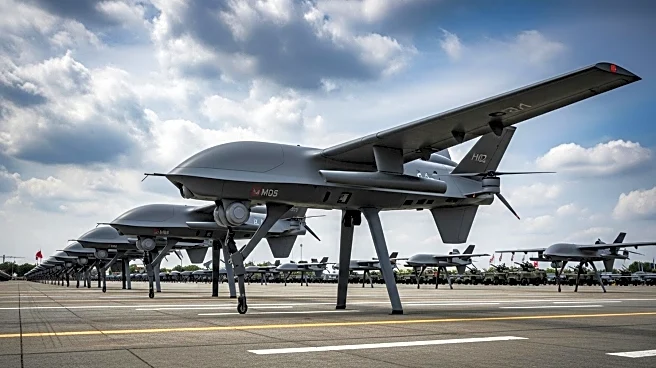What is the story about?
What's Happening?
China recently hosted its largest military parade to mark the 80th anniversary of the end of World War II, referred to by China as the war of resistance against Japanese aggression. The event was attended by numerous world leaders, including those from authoritarian states and the EU, showcasing a display of military might. President Xi Jinping was accompanied by Russian President Vladimir Putin and North Korean leader Kim Jong-un, highlighting a united front against Western influence. The parade featured advanced military hardware, including tanks, drones, and nuclear-capable missiles, emphasizing China's growing military capabilities. The gathering also coincided with the Shanghai Cooperation Organisation summit, where Xi announced plans for a development bank and energy cooperation platform, further solidifying China's role as a global power.
Why It's Important?
The military parade and summit underscore China's ambition to reshape the global order, challenging the U.S.'s position as the dominant superpower. By aligning with other authoritarian regimes, China is positioning itself as a leader of a bloc that opposes Western values and influence. This shift could have significant implications for global politics, human rights, and economic alliances. Countries that once relied on U.S. support may increasingly turn to China for economic and political stability, potentially altering international relations and trade dynamics. The parade also highlights China's focus on military preparedness, particularly concerning Taiwan, which could escalate tensions in the region.
What's Next?
China's actions may prompt responses from Western nations, particularly the U.S., as they reassess their strategies in dealing with China's growing influence. The U.S. may seek to strengthen alliances with other democracies and increase military presence in Asia to counterbalance China's power. Additionally, China's emphasis on non-interference in other countries' affairs may attract more nations to its sphere of influence, further challenging Western-led initiatives on human rights and democratic reforms. The evolving geopolitical landscape will likely lead to increased diplomatic and economic maneuvering as countries navigate the new power dynamics.
Beyond the Headlines
The parade and summit highlight the ethical and cultural dimensions of China's rise, as it promotes a model of governance that contrasts with Western democratic ideals. This could lead to long-term shifts in global governance structures, where authoritarian regimes gain more legitimacy and influence. The emphasis on military strength also raises concerns about the potential for conflict, particularly in regions like Taiwan, where China's territorial claims are contested. As China continues to assert its dominance, the balance between peace and confrontation will be a critical factor in shaping future international relations.
















